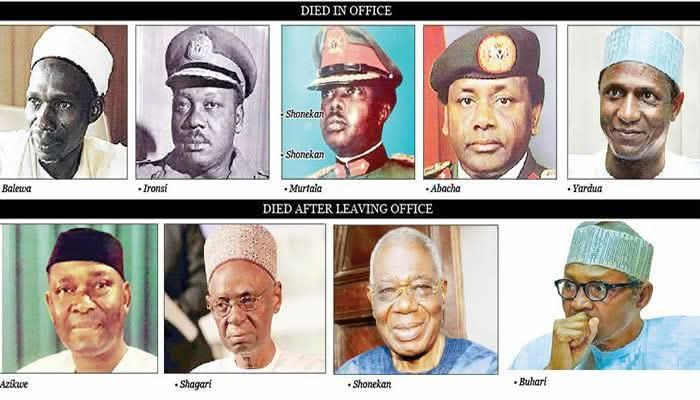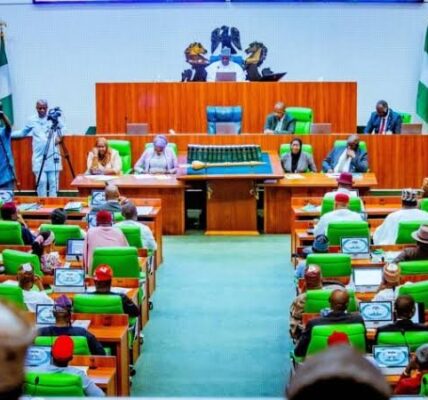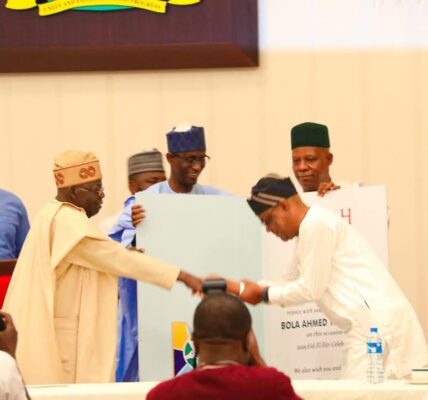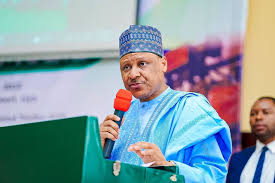As Buhari Joins Ranks Of Late Nigerian Presidents
igeria continues to mourn the passing of its former military Head of State and two-term civilian President, Muhammadu Buhari, whose death on Sunday, July 13, 2025, in a London hospital, closed a defining chapter in the nation’s political history.
Buhari, aged 82, remains one of only two Nigerians—alongside Chief Olusegun Obasanjo—to have ruled the country both in uniform and civilian garb.
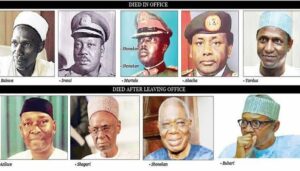
As flags fly at half-mast and tributes pour in from across the globe, Buhari’s death brings renewed attention to Nigeria’s turbulent journey through leadership, shaped by coups, ballots, and the blood of patriots.
Since the office of Head of State was established in 1963, 14 men have occupied the position in 16 separate presidencies. The country has seen both the idealism of elections and the brutal imposition of military might. Its leaders have emerged from ballot boxes and barracks, from negotiations and uprisings.
The late Sir Abubakar Tafawa Balewa, who held office as Prime Minister from 1960 until his assassination in 1966, remains Nigeria’s only head of government to have emerged from a Westminster-style parliamentary system. Since then, the Presidency has evolved into the central symbol of national leadership—often a contested throne of power and peril.
The nation’s leaders emerged either after coups or elections. In the 65-year history of the nation, those who have ruled are Tafawa Balewa (1960-1966); Nnamdi Azikwe (1963-1966); Johnson Aguiyi-Ironsi (1966); Yakubu Gowon (1966-1975); Murtala Muhammed (1975-1976); Olusegun Obasanjo (1976-1979); Shehu Shagari (1979-1983); Muhammadu Buhari (1983-1985); Ibrahim Babangida (1985-1993); Ernest Shonekan (1993); Sani Abacha (1993-1998); Abulsalami Abubakar (1998-1999); Olusegun Obasanjo (1999-2007); Umaru Yar’Adua (2007-2010); Goodluck Jonathan (2010-2015); Muhammadu Buhari (2015-2023) and Bola Tinubu (2003 till present).
However, Since gaining Independence in 1960, Nigeria has had its fair share of turbulence and bliss.
Leadership and losses
In the six-and-a-half decades since independence, Nigeria’s leadership story has been punctuated by a litany of military coups, each driven by a cocktail of grievances, ranging from alleged corruption and ethnic tensions to economic mismanagement and political exclusion.
The death of Buhari brings to nine the number of past leaders who have died out of 15 rulers. Tafawa Balewa died on January 15, 1966 at the age of 53; Nnamdi Azikiwe died on May 11, 1996 at 91; Johnson Aguiyi-Ironsi died aged 42, on July 29, 1966; Murtala Muhammed died at 37 years, on Feb 13, 1976; Shehu Shagari died at 93 years on December 28, 2018; Ernest Shonekan died on 11 January 2022, aged 85 years; Sani Abacha died June 8, 1998, at 55 years and Umaru Musa Yar’Adua died May 5, 2010, age 58 years.
While some died while serving in office, others died after leaving office. Those who died in office were Tafawa Balewa, Johnson Aguiyi-Ironsi, Murtala Muhammed, Sani Abacha, and Umaru Yar’Adua. The trio of Balewa, Aguiyi-Ironsi and Muhammad were assassinated in office, while Sani Abacha and Umaru Musa Yar’Adua are believed to have died of natural causes.
No fewer than six successful military coups have occurred, with at least four originating from discontent within the Nigerian Armed Forces. These upheavals, sometimes bloodless but often violent, redrew the lines of governance. They were rationalised by claims of national interest but left trails of trauma and interrupted democratic transitions.
From the first coup of January 15, 1966, led by Major Chukwuma Nzeogwu, which toppled Balewa’s government, to the palace coups of the 1990s, Nigeria’s leadership history reads like a tragic drama of ambition, betrayal, and redemption.
The January 1966 coup claimed the lives of Balewa, the Premier of Northern Nigeria, Sir Ahmadu Bello; the Premier of the Western Region, Chief S.L. Akintola; Finance Minister, Chief Festus Okotie-Eboh, and several senior military officers. The coup, widely described as ethnically biased, provoked a bloody counter-coup six months later.
Major General Johnson Aguiyi-Ironsi, who assumed power in the wake of Balewa’s assassination, was himself ousted and killed in the July 1966 counter-coup, led by northern officers. His death, alongside that of his host, Lt. Col. Adekunle Fajuyi, in Ibadan, further deepened national fault lines. Aguiyi-Ironsi’s body was later found dumped by the roadside. While conspiracy theories abound, witnesses like veteran journalist Segun Osoba described his corpse as being strangely intact days after his death, fueling speculation about the exact cause.
General Yakubu Gowon, then Chief of Army Staff, emerged as Head of State following the counter-coup and led the country through the 1967–1970 civil war. He was eventually overthrown in a bloodless palace coup in 1975 while attending an OAU summit in Kampala, Uganda. His successor, General Murtala Muhammed, would serve only 200 days in office before being assassinated in a failed coup attempt by Lt. Col. Buka Suka Dimka in 1976.
Following Murtala’s assassination, General Olusegun Obasanjo assumed power, overseeing the nation’s return to democracy in 1979. Civilian rule was, however, short-lived.
President Shehu Shagari was removed in a bloodless New Year’s Eve coup in 1983 led by General Muhammadu Buhari. Two years later, Buhari himself was overthrown by General Ibrahim Babangida, who ruled until he controversially stepped aside following the annulment of the June 12, 1993, election. Chief Ernest Shonekan briefly headed the Interim National Government before being swept aside by General Sani Abacha in yet another palace coup.
With Buhari’s death, nine of Nigeria’s 15 former leaders have now passed away. Five of them—Tafawa Balewa, Aguiyi-Ironsi, Murtala Muhammed, Sani Abacha, and Umaru Musa Yar’Adua—died in office. Balewa, Aguiyi-Ironsi, and Murtala were assassinated; Abacha and Yar’Adua died of natural causes, though not without controversy.
Balewa’s death remains one of the most mysterious in Nigerian history. His body, found six days after the coup, showed no visible wounds. Some accounts suggest he may have died from an asthmatic attack. His assassination triggered riots in the North and set the stage for a deadly cycle of revenge and military interventions.
Aguiyi-Ironsi, accused of shielding the masterminds of the January coup, was seized and executed by mutinous northern officers. Murtala, charismatic and populist, fell to gunfire in Lagos in 1976, a casualty of internal military discontent.
General Sani Abacha, who ruled with an iron fist from 1993 until his sudden death on June 8, 1998, remains shrouded in intrigue. Official accounts say he died of a heart attack in the Presidential Villa, Abuja. Yet speculations abound. While some allege he was poisoned, his former Chief Security Officer, Major Hamza Al-Mustapha, maintains that his health deteriorated after a handshake with Palestinian leader Yasser Arafat at the Abuja airport on June 7.
President Umaru Musa Yar’Adua succumbed to chronic health issues on May 5, 2010, following a lengthy battle with pericarditis and kidney complications. He had been absent from office for months and only returned from medical treatment in Saudi Arabia shortly before his death.
Civilian Statesmen and Their Final Journeys
Among those who died after leaving office are Nnamdi Azikiwe (1996), Shehu Shagari (2018), Ernest Shonekan (2022), and now Muhammadu Buhari (2025). Azikiwe, Nigeria’s first President, passed away at 91, reportedly lamenting in his final moments: “I chose heroism instead of sainthood… Who will remember to pray for me anymore?” His body was laid to rest in Enugu.
Shagari, the first executive President, died at 93 in Abuja after a brief illness. Shonekan, who headed the short-lived ING, died at 85 of pneumonia complications in a Lagos hospital.
Buhari, until his death, battled health issues that drew criticism throughout his presidency. Repeated medical trips to London fueled allegations of secrecy and absentee governance. While he occasionally handed power to Vice President Yemi Osinbajo during absences, there were stretches where he governed by proxy.
His death on Sunday follows years of speculation and health challenges—some diagnosed as severe ear infections, others undisclosed. He will be buried on Tuesday, July 15, in his hometown of Daura, Katsina State. In his honour, the Federal Government has declared a national public holiday.
In a statement by the Ministry of Interior, signed by Permanent Secretary Dr. Magdalene Ajani, the holiday was announced as part of a seven-day national mourning period approved by President Bola Tinubu.
Living Legends
With Buhari’s passing, six former heads of state remain alive: General Yakubu Gowon, General Ibrahim Babangida, General Abdulsalami Abubakar, Chief Olusegun Obasanjo, Dr. Goodluck Jonathan, and President Bola Ahmed Tinubu.
Their stories, like those before them, form the complicated mosaic of Nigeria’s leadership history—a chronicle shaped by ambition, service, betrayal, illness, assassination, and redemption.
As the nation reflects on the life and times of Buhari, it also looks back on a history soaked in both triumph and tragedy. And in doing so, it renews an enduring question: what does leadership mean in a country forever poised between the shadows of its past and the promise of its future?


